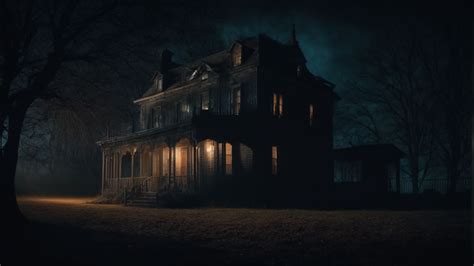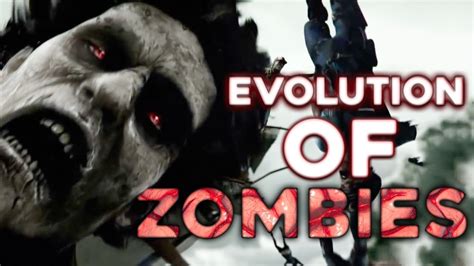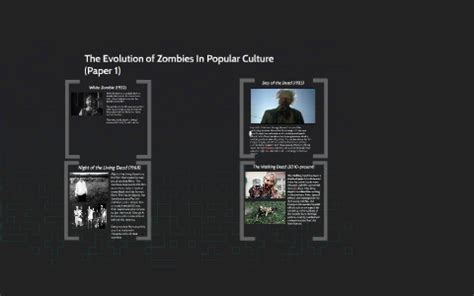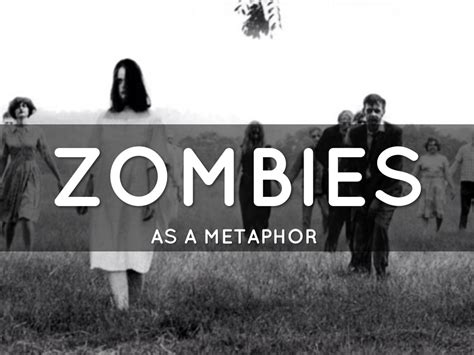In today's popular culture, there is an undeniable fascination with beings that defy the natural order of life and death. These creatures, known by various names and portrayed in various forms, have captivated audiences for centuries. This article seeks to delve into one particular manifestation of this fascination - the mesmerizing world of zombies.
What is it about zombies that draws us in, compels us to watch movies, read books, and play video games featuring these reanimated corpses? Perhaps it is the sense of danger that they embody, the threat they pose to our very existence. Zombies symbolize the fragility of life and our constant struggle against an uncertain future.
Furthermore, by exploring the concept of zombies, we are forced to confront our own mortality. These inhuman creatures serve as a stark reminder that death is an inevitable part of our journey, and their presence in fiction allows us to contemplate the meaning of life in the face of such existential horrors. The undead, with their decaying bodies and insatiable hunger for human flesh, force us to question the nature of humanity itself.
However, the allure of zombies extends beyond mere contemplation of our mortality. Zombies also represent a societal critique, serving as metaphorical reflections of our fears, anxieties, and societal issues. Through their mindless pursuit and consumption of living flesh, zombies serve as a commentary on our own insatiable desires and the dangers of unchecked consumption. They embody the dark side of human nature, reminding us of the potential for chaos and destruction that lies within each of us.
The Psychology Behind Our Fascination with the Undead

Humans' deep-rooted captivation with creatures that defy the natural order of life has long perplexed researchers and psychologists alike. This curiosity extends beyond the realm of traditional monsters and into an overwhelming fascination with zombies.
At its core, our obsession with the walking dead stems from a complex interplay of psychological and social factors. The concept of the undead, resilient and relentless, poses a mirror to our own deepest fears and anxieties, resonating with our innate desire to explore the boundaries of life and death.
On one hand, the appeal of zombies can be traced to our inherent need for self-preservation. These creatures embody the threat of a chaotic and unpredictable world, triggering an instinctual response to evaluate our own survival capabilities. It forces us to confront our deepest fears and question what we would do in the face of an apocalyptic event.
On the other hand, the allure of zombies also resides in the exploration of human nature and the fragility of our social structures. In the zombie narrative, societal norms collapse, exposing the raw essence of humanity. This allows for the examination of themes such as morality, ethics, and the darker aspects of human behavior.
Furthermore, our fascination with zombies can be attributed to their symbolic representation of our collective anxieties. In an ever-changing world filled with uncertainty, zombies represent the embodiment of societal fears such as pandemics, societal collapse, and the loss of individual identity. By confronting these fears in a controlled and fictional setting, we gain a sense of catharsis and reassurance.
In conclusion, the psychology behind our obsession with zombies is multifaceted and deeply rooted in our human nature. As we continue to delve into the world of the undead, it is clear that our fascination with zombies serves as a reflection of our own desires, fears, and the never-ending quest to understand the complexities of the human psyche.
Zombie Films That Revolutionized the Genre
In this section, we will delve into a captivating exploration of the cinematic works that have profoundly influenced and transformed the zombie genre. These collections of visual narratives not only defy conventions but also ignite a profound allure for audiences worldwide.
| Film Title | Release Year | Director |
|---|---|---|
| The Night of the Living Dead | 1968 | George A. Romero |
| 28 Days Later | 2002 | Danny Boyle |
| Shaun of the Dead | 2004 | Edgar Wright |
| World War Z | 2013 | Marc Forster |
These films have etched their marks in the annals of cinematic history, redefining the concept of the undead and reshaping the nature of storytelling within the zombie genre. From George A. Romero's ground-breaking "The Night of the Living Dead" to the fast-paced intensity of Danny Boyle's "28 Days Later," the evolution of these films serves as a testament to the enduring fascination with zombies in popular culture.
The Evolution of Zombie Legends

In this section, we will delve into the captivating history surrounding the folklore and mythology of the walking dead creatures that have intrigued and frightened people for centuries.
Throughout history, different cultures have developed tales and beliefs centered around lifeless beings revived from the grave. These mythical creatures, known by various names and taking on different forms, have been a source of intrigue, fear, and fascination across generations.
We will explore the early origins of these legends, tracing their roots back to ancient civilizations such as Mesopotamia and Egypt. From there, we will follow their progression through time, observing how different societies and cultures depicted the undead and the role they played in their respective mythologies.
Through the examination of diverse folklore and religious texts, we will uncover the common themes and characteristics associated with these resurrected beings throughout history. From mindless flesh-eating creatures to cursed souls seeking redemption, each culture has contributed its unique interpretation of the mythological zombie.
Additionally, we will delve into the cultural impacts that have shaped and perpetuated the zombie mythology. From the Haitian voodoo traditions to the influence of literature, film, and video games, we will explore how these undead legends have gained immense popularity and captured the imagination of modern society.
- Understanding the historical context of zombie legends
- Examining the diverse representation of zombies in different cultures
- Uncovering the common characteristics of undead creatures throughout mythology
- Exploring the influence of voodoo and other cultural practices on zombie myths
- Tracing the evolution of the zombie mythology in literature, film, and popular culture
By dissecting the fascinating history surrounding the zombie mythology, we can gain a better understanding of its enduring appeal and the reasons behind its continued popularity in contemporary times.
Unveiling the Allure of a Zombie Apocalyptic Scenario
What is it about a world overrun by the undead that captures our imagination and compels us to envision apocalyptic scenarios? A zombie-infested landscape, with its desolate cityscapes, abandoned buildings, and desperate survivors, serves as a captivating backdrop for narratives that explore the human condition in extreme circumstances. This article delves into the various elements that make a zombie apocalyptic scenario so enthralling.
- The Otherworldly Threat: At the core of the fascination lies the primal fear of the unknown. Zombies, with their mindless existence and relentless pursuit, embody a malevolent force that challenges our sense of security and control. This fear of the unknown intertwines with our ongoing struggle to comprehend mortality and the possibility of life after death.
- Survival Instincts in Overdrive: A zombie apocalyptic scenario places survival at the forefront, forcing individuals to navigate an unforgiving world where resources are scarce and danger lurks at every turn. In this fight for survival, characters must tap into their primal instincts and adapt to the harsh reality, presenting an opportunity for exploration of the human capacity for resilience and ingenuity.
- The Fragility of Society: With the collapse of civilization, the established order crumbles, giving rise to a lawless and chaotic environment. In a zombie-infested world, social hierarchies, norms, and values are stripped away, and individuals are left to question their roles and identities. This exploration of societal fragility allows for commentary on the fragility of our own social structures and challenges the notion of what it means to be human.
- Morality in the Face of Desperation: In a world where survival often necessitates making morally ambiguous choices, the lines between right and wrong become blurred. The zombie apocalypse presents an opportunity to examine the ethical dilemmas faced by individuals pushed to their limits and prompts contemplation of the inherent moral compass that guides human behavior.
- Connection and Isolation: Amidst the chaos, relationships are formed and tested. The bonds forged in the face of adversity offer glimpses of hope and provide emotional anchors in a world filled with uncertainty. Conversely, the sense of isolation and loneliness that pervades a zombie-infested world sheds light on the importance of human connection and belonging.
In conclusion, the allure of a zombie apocalyptic scenario stems from a combination of factors. It taps into our primal fears, explores the resilience of the human spirit, questions societal structures, examines morality, and emphasizes the value of human connection. Through the lens of the undead, we are able to reflect on our own humanity and contemplate the fragile nature of the world we inhabit.
The Evolution of Zombies in Pop Culture

Exploring the ever-changing portrayal of zombies in popular culture unveils a fascinating journey that has captivated audiences for decades. This section delves into the transformation and development of these undead creatures, tracing their significance and impact on various forms of media.
The Influence of Zombie Video Games on Society
Within the realm of interactive digital entertainment, there exists a genre that captivates the minds of individuals from all walks of life. This particular genre has transcended traditional boundaries and carved a prominent place within popular culture. Examining the impact of video games centered around the undead serves as a fascinating lens through which to explore the extent of their influence on society. By delving into the world of these virtual experiences, we can gain insights into both the positive and negative effects they have on individuals and broader communities.
Exploring the Global Undead Enthusiast Community

Within the vast landscape of undead fandom, a vibrant and diverse global community of zombie enthusiasts exists. This passionate group of individuals, from various backgrounds and cultures, shares a common fascination and curiosity about the undead.
United by their love for the macabre and a thirst for thrilling narratives, the global undead enthusiast community thrives on the exploration of the zombie genre's multifaceted appeal. From the depths of literature to the silver screen, this community actively engages with zombie-related content through various mediums, seeking out both classic tales and emerging narratives.
Whether it be through the consumption of zombie literature, films, or television series, this community immerses themselves in the post-apocalyptic world where survival skills and strategies take center stage. They eagerly dissect the symbolism and metaphors that the zombie genre presents, using it as a lens to understand societal anxieties, explore complex moral dilemmas, and reflect upon the human condition.
Online platforms serve as the epicenter for connection and communication within the global zombie enthusiast community. Through forums, social media groups, and dedicated websites, individuals from every corner of the globe unite to discuss their favorite undead stories, share fan theories, and engage in spirited debates about the evolution of the genre.
In addition to their passion for consuming and analyzing zombie-related content, this community actively participates in events such as conventions, cosplay gatherings, and immersive experiences. These gatherings provide an opportunity for enthusiasts to bond, showcase their creativity, and celebrate their shared fascination with the undead.
- Engage in lively discussions on zombie-focused online forums
- Participate in zombie-themed cosplay at conventions
- Explore immersive zombie survival experiences
- Discover new undead narratives within literature and films
- Analyze the symbolism and societal implications of the zombie genre
The global undead enthusiast community serves as a testament to the enduring appeal of zombies, transcending geographical boundaries and cultural differences. Through their passion and engagement, they breathe life into the undead and contribute to the ever-evolving landscape of the zombie genre.
Zombie Survival Strategies: Myths vs Reality
In this section, we will explore the contrasting perspectives surrounding the strategies for surviving a zombie apocalypse. We will examine the common misconceptions and myths that have been perpetuated by popular culture, and compare them to the real-world practicalities of surviving a zombie outbreak.
Many people have formed their survival strategies based on fictional portrayals of zombies, such as movies and video games. However, it is important to distinguish between the fantastical elements and the realistic scenarios that one might encounter in a potential zombie-infested world.
Myth: One common myth is that having superior firepower will guarantee survival in a zombie apocalypse. The idea that guns will easily dispatch hordes of undead creatures may make for an entertaining movie, but in reality, ammunition is a finite resource that must be conserved. Additionally, the noise generated by firearms can attract more zombies, potentially putting the survivor at a greater risk.
Reality: A more practical approach to zombie survival involves a combination of physical fitness, resourcefulness, and strategic thinking. Developing skills in self-defense, melee weapons, and efficient barricading can be invaluable when facing both zombies and other survivors. Moreover, the ability to scavenge for food, water, and other essential supplies becomes crucial, as the collapse of infrastructure may limit access to resources.
Another myth is the belief that finding a fortified location, such as a shopping mall or a military base, will guarantee safety. While these locations may offer temporary refuge, they also come with their own drawbacks. Limited resources, increased competition for supplies, and the potential for betrayal or internal conflict within groups of survivors can quickly turn a seemingly safe haven into a death trap.
The reality is that adaptability and the ability to assess situations quickly are key factors in surviving a zombie outbreak. Remaining vigilant, practicing stealth, and constantly reevaluating one's surroundings are essential skills. Being able to form trustworthy alliances and maintain effective communication can also greatly enhance one's chances of survival.
In conclusion, it is clear that the popular perception of zombie survival is often influenced by entertainment rather than practical considerations. By debunking myths and examining realities, we can better prepare ourselves for the challenges that may arise in the event of a zombie apocalypse.
Why Are Zombies a Metaphor for Societal Fears?

Within the context of the topic surrounding the fascination with the undead, it is intriguing to explore why zombies have become a powerful metaphor for the deep-rooted fears and anxieties prevalent within society. These reanimated beings, devoid of humanity and driven by insatiable hunger, serve as a reflection of the underlying concerns and uncertainties that plague us.
One compelling reason behind the zombie's metaphorical significance lies in their relentless pursuit. Much like how societal fears persistently chase us, zombies relentlessly pursue their victims, embodying the relentless and oppressive nature of our own apprehensions. This unyielding pursuit highlights the inescapable nature of our anxieties and our constant quest for security and survival. |
Zombies also symbolize the erosion of individuality and the loss of autonomy within society. Through their mindless existence and lack of free will, they serve as a reminder of the conformity and groupthink that can permeate our lives. The zombie archetype raises questions about the extent to which societal pressures and expectations can strip away our individuality and transform us into mere followers, driven by primal instincts and devoid of independent thought. |
Another facet of the zombie metaphor is the portrayal of a crumbling world, often ravaged by a pandemic or apocalyptic event. This dystopian landscape represents fears of societal collapse, breakdown of structures, and the consequent chaos that may ensue. Zombies embody the chaos and destruction that can unfold when societal frameworks and norms are shattered, exposing the vulnerabilities and fragility of our systems. |
Furthermore, the spread of the zombie infection can be seen as a metaphor for the rapid dissemination of fear, panic, and irrationality within society. The contagious nature of their affliction reflects how societal fears and anxieties can quickly transmit and amplify, influencing the collective mindset and triggering irrational behaviors. This highlights the interconnectedness of our fears and the potential for them to rapidly spread and infect our thoughts and actions. |
In conclusion, zombies have become a powerful metaphor for societal fears due to their representation of relentless pursuit, erosion of individuality, crumbling worlds, and the rapid spread of fear. Through their depiction, they serve as a reminder of the underlying anxieties that plague us as individuals and as a society, urging us to confront and overcome these fears in order to preserve our humanity and collective well-being.
The Scientific Explanation Behind the Fictional Zombie Apocalypse
Within the realm of zombie lore, there exists an undeniable fascination with the concept of a zombie virus. This section aims to delve into the scientific basis, or lack thereof, behind the belief in such a virus. Exploring the theoretical origins, transmission methods, and potential effects on the human body provides insight into why this fictional concept has captured the imagination of so many.
Theoretical Origins: Zombie virus theories often center around a viral or bacterial pathogen that somehow alters brain function, resulting in the reanimation of the dead. While science has proven the existence of various pathogens capable of manipulating behavior in animals, the idea of a virus solely responsible for resurrecting corpses remains within the realm of fantasy.
Transmission Methods: Fictional narratives frequently portray zombies as contagious beings. They spread the virus through bites or other forms of contact, leading to rapid infection rates and overwhelming apocalyptic scenarios. In reality, there is no known virus that can transform a human into an undead creature or induce cannibalistic behaviors in healthy individuals.
Potential Effects on the Human Body: Zombie mythology often depicts creatures devoid of pain, fatigue, or the need for sustenance. While the idea of an immortal, indestructible being may be intriguing, science reveals that sustaining life without basic physiological needs is impossible. The human body requires sustenance, rest, and the ability to heal in order to function properly, making the concept of a true zombie virus incompatible with biological reality.
In conclusion, the fascination with zombie virus fiction stems from a combination of our innate fear of death, the human fascination with the supernatural, and the desire to explore the limits of scientific possibility. While there may not be a scientific basis for a real-life zombie virus, the allure of the concept persists as an intriguing aspect of popular culture.
FAQ
Why are zombies so popular in movies and TV shows?
Zombies are popular in movies and TV shows because they tap into our primal fears and provide an outlet for exploring the darker aspects of human nature. Additionally, their slow, relentless pursuit and the idea of a zombie apocalypse creates a thrilling and suspenseful narrative.
What is the origin of the zombie myth?
The origin of the zombie myth can be traced back to Haitian folklore and voodoo practices. In Haitian culture, a zombie is believed to be a reanimated corpse that is controlled by a sorcerer or witch, often used for slave labor. These beliefs were later popularized in Western culture through literature, films, and other forms of media.
How have zombies evolved throughout history?
Zombies have evolved throughout history in terms of their characteristics and representation. In Haitian folklore, they were depicted as mindless slaves, whereas in modern culture, they are often characterized as flesh-eating, undead creatures. Additionally, the portrayal of zombies has shifted from being primarily associated with voodoo practices to being a result of a viral outbreak or scientific experiment gone wrong.
Why do people find the concept of a zombie apocalypse so intriguing?
People find the concept of a zombie apocalypse intriguing because it allows them to contemplate the collapse of society and how they would survive in such a situation. It also creates a sense of excitement and adventure, as individuals are forced to confront their fears and make life-or-death decisions in a world filled with chaos and danger.
What does the fascination with zombies say about society?
The fascination with zombies can reflect various aspects of society. It can be seen as an exploration of our collective anxieties about the collapse of civilization, the fear of a deadly pandemic, or the desire for survival and self-preservation. Additionally, the popularity of zombie-themed entertainment can also be attributed to the escapism it offers from the mundane realities of everyday life.
Why are zombies so popular in popular culture?
There are several reasons for the popularity of zombies in popular culture. One reason is the fear of the unknown and the idea of a post-apocalyptic world. Zombies represent the collapse of society and the struggle for survival. Additionally, zombies offer a safe way to explore our fears and anxieties about death and the afterlife. They also provide a sense of excitement and adrenaline rush in a controlled environment.



